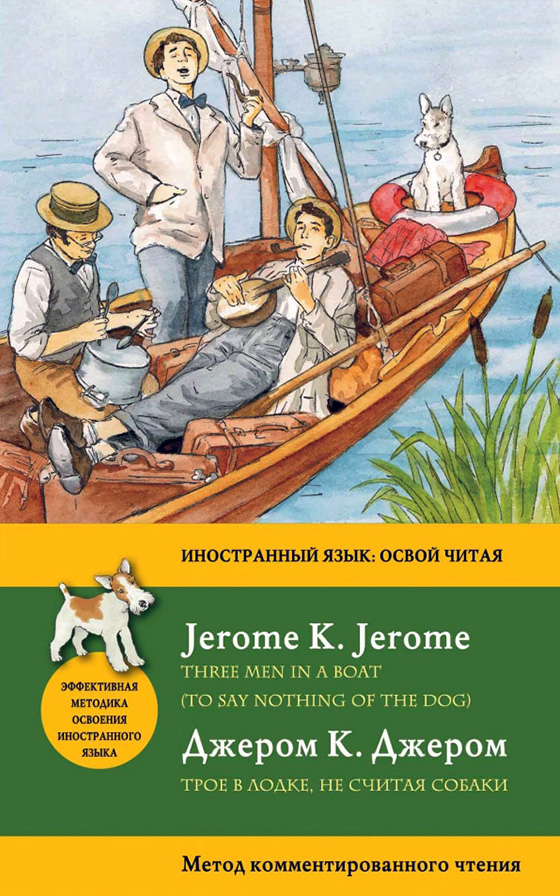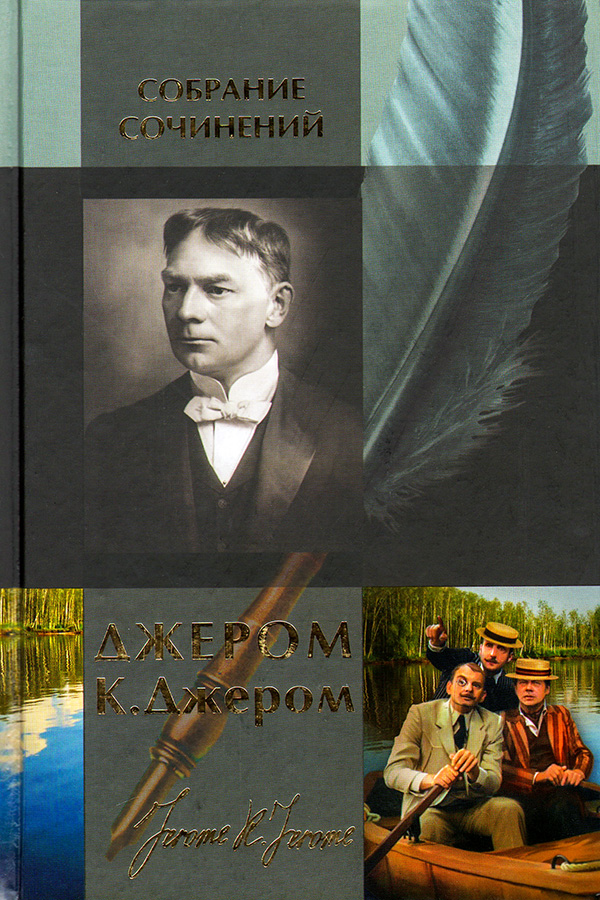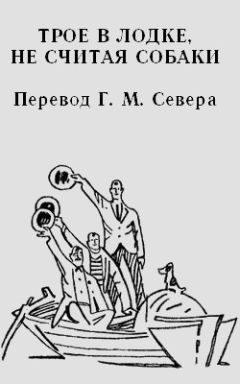становятся до крайности раздражительными.
| Little mishaps, that you would hardly notice on dry land, drive you nearly frantic with rage, when they occur on the water. |
Мелкие неприятности, которых вы просто не заметили бы на суше, приводят вас в исступление, если случаются на воде. |
| When Harris or George makes an ass of himself on dry land, I smile indulgently; when they behave in a chuckle-head way on the river, I use the most blood-curdling language to them. |
Когда Джордж и Гаррис валяют дурака на твердой земле, я только снисходительно улыбаюсь, если же они делают глупости на реке, я ругаю их последними словами. |
| When another boat gets in my way, I feel I want to take an oar and kill all the people in it. |
Когда мне мешает проехать чужая лодка, я испытываю желание взять весло и перебить всех, кто в ней сидит. |
| The mildest tempered people, when on land, become violent and blood-thirsty when in a boat. |
Самые тихие люди, садясь в лодку, становятся дикими и кровожадными. |
| I did a little boating once with a young lady. |
Я однажды катался с одной барышней. |
| She was naturally of the sweetest and gentlest disposition imaginable, but on the river it was quite awful to hear her. |
От природы это была особа необычайно кроткая я ласковая, но на реке ее было прямо-таки страшно слушать. |
| "Oh, drat the man!" she would exclaim, when some unfortunate sculler would get in her way; "why don't he look where he's going?" |
"Черт его подери! — кричала эта особа, когда какой-нибудь несчастный гребец мешал ей проехать. — Чего он смотрит, куда его несет?" |
| And, "Oh, bother the silly old thing!" she would say indignantly, when the sail would not go up properly. And she would catch hold of it, and shake it quite brutally. |
"Вот дрянь!" — с негодованием восклицала она, когда парус не хотел подниматься, и, грубо схватив его, трясла, как дерюгу. |
| Yet, as I have said, when on shore she was kind-hearted and amiable enough. |
На берегу же, повторяю, она была приветлива и добра. |
| Man at the lock Man at the lockThe air of the river has a demoralising effect upon one's temper, and this it is, I suppose, which causes even barge men to be sometimes rude to one another, and to use language which, no doubt, in their calmer moments they regret. |
Речной воздух губительно действует на характер, и в этом, я думаю, причина, почему даже лодочники иногда грубы друг с другом и допускают выражения, о которых в более спокойную минуту несомненно готовы пожалеть. |
| CHAPTER XIX. |
ГЛАВА ДЕВЯТНАДЦАТАЯ |
| Oxford.-Montmorency's idea of Heaven.-The hired up-river boat, its beauties and advantages.-The "Pride of the Thames."-The weather changes.-The river under different aspects.-Not a cheerful evening.-Yearnings for the unattainable.-The cheery chat goes round.-George performs upon the banjo.-A mournful melody.-Another wet day.-Flight.-A little supper and a toast. |
Оксфорд. Представление Монморенси о рае. Наемная лодка, ее прелести и преимущества. "Гордость Темзы". Погода меняется. Река в разных видах. Не слишком веселый вечер. Стремление к недостижимому. Оживленная болтовня. Джордж исполняет пьесу на банджо. Унылая мелодия. Снова дождливый день. Бегство. Легкий ужин, заканчивающийся тостом. |
| Dog runningWe spent two very pleasant days at Oxford. |
Мы провели в Оксфорде два приятных дня. |
| There are plenty of dogs in the town of Oxford. |
В городе Оксфорде много собак. |
| Montmorency had eleven fights on the first day, and fourteen on the second, and evidently thought he had got to heaven. |
Монморенси участвовал в первый день в одиннадцати драках, во второй — в четырнадцати и несомненно решил, что попал в рай. |
| Dogs fightingAmong folk too constitutionally weak, or too constitutionally lazy, whichever it may be, to relish up-stream work, it is a common practice to get a boat at Oxford, and row down. |
Люди, по врожденной лени или слабости неспособные наслаждаться тяжелым трудом, обычно садятся в лодку в Оксфорде и гребут вниз. |
| For the energetic, however, the up-stream journey is certainly to be preferred. |
Однако для человека энергичного путешествие вверх по реке несомненно приятнее. |
| It does not seem good to be always going with the current. |
Нехорошо все время плыть по течению. |
| There is more satisfaction in squaring one's back, and fighting against it, and winning one's way forward in spite of it-at least, so I feel, when Harris and George are sculling and I am steering. |
Гораздо больше удовольствия, напрягая спину, бороться с ним, идти вперед наперекор ему, — по крайней мере мне так кажется, когда Гаррис с Джорджем гребут, а я правлю рулем. |
| Dog runningTo those who do contemplate making Oxford their starting-place, I would say, take your own boat-unless, of course, you can take someone else's without any possible danger of being found out. |
Тем, кто намерен избрать Оксфорд отправным пунктом, я посоветую: запаситесь собственной лодкой (если, конечно, вы не можете взять чужую без риска, что это обнаружится). |
| The boats that, as a rule, are let for hire on the Thames above Marlow, are very good boats. |
Лодки, которые сдаются внаем на Темзе, выше Марло, как правило, очень хороши. |
| They are fairly water-tight; and so long as they are handled with care, they rarely come to pieces, or sink. |
Они почти не протекают, и если осторожно с ними обращаться, редко разваливаются на куски или тонут. |
| There are places in them to sit down on, and they are complete with all the necessary arrangements-or nearly all-to enable you to row them and steer them. |
В них есть на чем сесть, и они снабжены всеми или почти всеми приспособлениями для того, чтобы грести и править рулем. |




